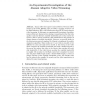Free Online Productivity Tools
i2Speak
i2Symbol
i2OCR
iTex2Img
iWeb2Print
iWeb2Shot
i2Type
iPdf2Split
iPdf2Merge
i2Bopomofo
i2Arabic
i2Style
i2Image
i2PDF
iLatex2Rtf
Sci2ools
154
click to vote
USAB
2010
2010
An Experimental Investigation of the Akamai Adaptive Video Streaming
Akamai oers the largest Content Delivery Network (CDN) service in the world. Building upon its CDN, it recently started to offer High De
nition (HD) video distribution using HTTP-based adaptive video streaming. In this paper we experimentally investigate the performance of this new Akamai service aiming at measuring how fast the video quality tracks the Internet available bandwidth and to what extent the service is able to ensure continuous video distribution in the presence of abrupt changes of available bandwidth. Moreover, we provide details on the client-server protocol employed by Akamai to implement the quality adaptation algorithm. Main results are: 1) any video is encoded at
ve dierent bit rates and each level is stored at the server; 2) the video client computes the available bandwidth and sends a feedback signal to the server that selects the video at the bitrate that matches the available bandwidth; 3) the video bitrate matches the available bandwidth in roughly 150 secon...
Related Content
| Added | 31 Jan 2011 |
| Updated | 31 Jan 2011 |
| Type | Journal |
| Year | 2010 |
| Where | USAB |
| Authors | Luca De Cicco, Saverio Mascolo |
Comments (0)

